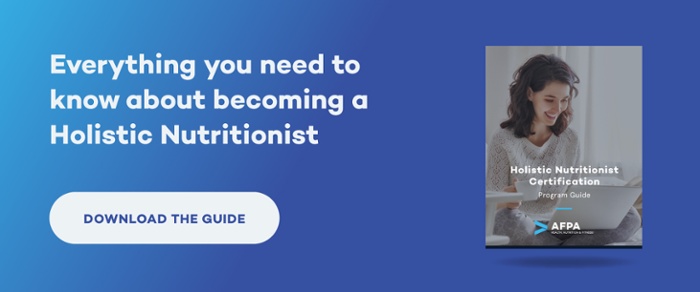Adaptogenic herbs are becoming increasingly popular as alternatives to prescription medications for treating anxiety and depression, boosting the immune system, and improving overall health. If you have a passion for holistic nutrition and want to help your clients live a healthier lifestyle, then adaptogenic herbs might provide the perfect natural solution.
What Are Adaptogens?
Encompassing a variety of natural medicines, adaptogens are herbs and plants that help the body’s adrenal system respond to physical, biological, and chemical stressors. Although adaptogens have been used for centuries in Indian Ayurvedic and Chinese medicine, the term adaptogenic wasn’t coined until 1947 by Soviet scientist Dr. Nikolai Lazarev. During World War II, scientists began studying traditional medicines to find ways to help soldiers adapt to the stress and rigors of war.
Generally speaking, adaptogens meet the following criteria:
- They are nontoxic.
- They produce a nonspecific response in the body in order to boost the body’s natural ability to resist stress.
- They have a normalizing effect on the body.
Become a Certified Holistic Nutritionist Online in 6 Months or Less
When a person’s brain and hormones are properly balanced and aligned, his or her mood, metabolism, energy, immune system, and sex drive are healthier and work more efficiently. When these delicate relationships are unbalanced, it can lead to thyroid problems, libido issues, and adrenal fatigue.
Choosing the Right Adaptogens
When working efficiently and effectively, the adrenal glands should produce stress hormones quickly when the body needs them to, but they should also stop on a dime when no longer needed. Unfortunately things don’t always work out this way, and this is where adaptogens come in: They push the adrenal glands to react more quickly so the body spends less energy and time producing stress hormones. Here are some adaptogens that you can recommend to your clients to help them fight stress and anxiety:
Adaptogens for Stress
Stress affects everyone at some time, and chronic stress can cause incredible damage to the body—from the brain to the heart to the stomach to the intestines and even to the reproductive system. Stress can cause headaches, lack of energy, memory problems, increased blood pressure, weight gain, constipation, lowered libido, and more. Here are some adaptogens that have been shown to help battle stress:
- Ashwagandha: This herb from the nightshade family helps regulate cortisol, which is the body’s stress hormone. One of the most powerful herbs in Ayurvedic healing, it is excellent for battling emotional and physical stressors.
- Licorice root: When the body is under chronic mental and physical stress, the adrenal glands become exhausted from the constant release of cortisol. Licorice root has been shown to prevent the body from exhausting its store of cortisol to battle adrenal fatigue. It’s also popular for use with stomach ailments that are induced by stress.
- Mucuna pruriens: Dopamine is a powerful neurotransmitter that helps control the brain’s reward centers, and Mucuna pruriens (a bean) is packed with L-dopa to help lower stress. It also helps lower anxiety, increase focus, improve mood, and more.
- Rhodiola rosea: If your client is suffering from adrenal fatigue, this traditional Chinese herb, also known as golden root, can help reduce stress. Be careful with dosing, however, because it has been known to keep people awake at night.
Adaptogens for Anxiety
Anxiety disorders affect 40 million adults (ages 18 and older) in the United States and 25.1 percent of children ages 13-18. These disorders are highly treatable, but many people go without treatment. If you have a client who is experiencing anxiety, consider recommending these adaptogens:
- Ashwagandha: This impressive herb not only helps with stress, but it also fights anxiety. In fact, according to a study in the Indian Journal of Psychological Medicine, patients taking ashwagandha saw their cortisol levels drop by 28 percent.
- Bacopa monnieri: This creeping marsh plant has been used to boost cognition and help with anxiety and depression.
- Holy basil: In addition to being a powerful anxiety-fighting adaptogen, holy basil, also known as tulsi, is considered an aphrodisiac and delivers impressive liver support.
- Lion’s mane: This mushroom has been shown in clinical studies to lower anxiety and depression levels and increase concentration. Lion’s mane has numerous other health benefits, including improved gut health, increased energy levels, and effectiveness against neurodegenerative disorders.
- Reishi: Another mushroom, reishi has been used in traditional Chinese medicine for centuries to fight insomnia and anxiety, as well as to increase mental clarity.
Side Effects of Adaptogens
Although the side effects vary from adaptogen to adaptogen, it’s important to note that the quality and purity of adaptogen supplements are not monitored by the Food and Drug Administration (FDA). In fact, in a 2018 study, some common herbal supplements were shown to have negative interactions with some prescription medications. Many people don’t like telling their doctors what supplements and over-the-counter medications they are taking, but because of the potential interactions, it’s important that you encourage your clients to speak with their doctors prior to starting any supplement regimen.
Additionally, it’s important to consider any allergies or gastrointestinal reactions that your clients might experience if they take certain adaptogens. For example, ginseng has been known to cause stomachaches and sleep loss, and Rhodiola rosea has caused insomnia. As a nutritionist, it’s important to take a thorough, holistic look at your clients to assess the best adaptogenic solution to aid the immune system and fight stress and anxiety.
Getting Started with Adaptogens
Although most adaptogens can be consumed straight, they are typically consumed in one of these ways:
- As a part of a meal (this is great for lion’s mane or holy basil)
- Steeped to make a tea
- Consumed as a tincture mixed into a liquid
- As a powder mixed into a smoothie, soup, or salad dressing
- Taken as a supplement capsule
It’s important to note that supplements aren’t regulated, and as such there are plenty of companies that put just a small amount of the adaptogen into a capsule mixed with other things your client might not need or want. Take care to choose a reliable supplement source to avoid dubious and potentially hazardous outcomes.
As adaptogenic herbs grow in popularity for treating anxiety and depression and improving overall health, you have the opportunity to turn your passion for wellness into solutions for your clients. Learn more by downloading our Holistic Nutritionist Program Guide now.




